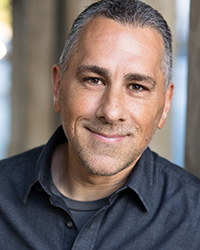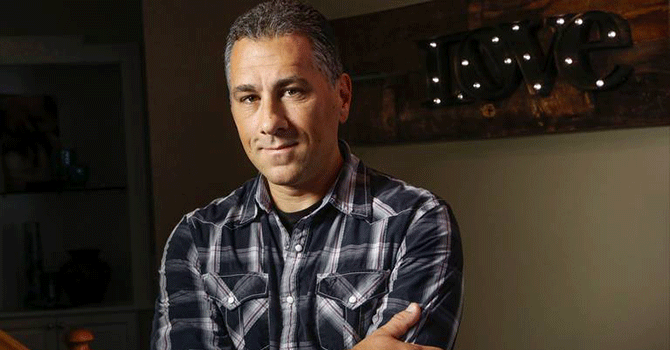John Pavlovitz is a man just trying to get this life right.
The former church pastor, based in North Carolina, has emerged as a voice for progressive Christians through his popular blog, Stuff That Needs To Be Said. There, he has tackled presidential politics, gay rights, gun violence and other topics often avoided in “polite” Christian circles — and exploited in others.
Pavlovitz, who grew up Catholic, attended Eastern Baptist Theological Seminary in Philadelphia before serving churches in Charlotte and Raleigh. In his upcoming book, “If God Is Love, Don’t Be a Jerk,” Pavlovitz envisions a world where people of faith try, in his words, not to be horrible.
He writes:
My formative religious tradition has been Christianity, and you’ll hear many references to Jesus and to the stories of the Bible here, but this isn’t about us matching theologically; it’s about each of us stretching to reach a more expansive, more compassionate place than we started — which it turns out was always the point. The New Testament records Jesus teaching people about needing to put his “new wine” teaching into “new wineskins,” not the brittle, rigid old ones they’d been used to. He was asking people to have minds pliable enough and imaginations limber enough to consider a God beyond the one they currently believed in or the systems they inherited — and to extend themselves to people they’d never have lovingly engaged before.

Pavlovitz further explains on his website:
I’d love for you to take this journey with me and see where you end up, which doesn’t need to be in aligning with me theologically or agreeing with me politically or sharing my religious worldview. I’d just like you to dig a little deeper into your own reservoirs of empathy and see what that might yield. I’m hoping that journey will be challenging, humorous, uncomfortable, and messy.
I think your relationships are worth it.
I think your well-being is worth it.
I think the Church is worth it.
I think a world that could use a little more kindness is worth it, too. What do you say?
Let’s not be jerks, together.
From what he preaches through his writing to how he goes about doing the work — as a pandemic toilet paper superhero, for example — the author, blogger and father is choosing to spread compassion, and he urges others to do the same.
He recently spoke with Faith & Leadership’s Kristine McNeill about his most recent book and shared some thoughts about his life and work. The following is an edited transcript.
Faith & Leadership: What led you to write this book? What was the “aha!” moment that said to you that people need to hear this?
John Pavlovitz: This book was started in March of 2020, and it was originally going to be a very different book. But as the pandemic started to happen and you had the residual effects of the Black Lives Matter protests and then you had the election stuff happening, I really started to look around and realize that so much of the division and the hatred seemed to be coming from predominantly white Christians.
I felt I needed to speak explicitly into that moment, and so the book changed direction, and I began to try to understand why something that we know started so beautifully often turns so ugly. That was the journey that I began every week, just writing a completely different story than I had intended.
F&L: The title is hilarious, and the chapter titles are inventive (like “The Dude Abides” and “Holy Ferocity”). How did you come up with those?
JP: A lot of the work I write — it’s very heavy. I do have a pretty good sense of humor, and I tried to make sure that it came through and that my personality was there. The title “If God Is Love, Don’t Be a Jerk” was just a playful way to say, “If love is supposed to be our calling card, why is it that so frequently when I say the word ‘Christian,’ people say words like ‘hateful’ and ‘judgmental’ and ‘hypocritical’?”
I just wanted to plainly say that love is the main thing here, and if we’re getting it wrong, then what’s the point? The chapter titles are just all a part of that — a way to speak plainly and openly.
F&L: You use a lot of personal stories to set the scene in your chapters. Why did you choose the method of storytelling?
JP: I think story is universal. It’s where we connect. I think often people are going to be reached theologically or through Scripture, but most of the time they’re going to be reached through the commonality of our human experience. The more that I can do that and invite people into my story or the story of people whose narratives they may not be familiar with, I think that’s the most effective thing. It’s exposing people to a depth and breadth of stories.
F&L: Speaking of your story, you have retired as a pastor. How has that affected how you see the world?
JP: I’ve retired from local church ministry, but I have a very different kind of congregation. I still have the pastoral heart, and so my work is really in this expansive community that comes to me, and I love it. It’s a disparate gathering of people, and I get to share my faith openly, and where I am in my journey, and people get to share theirs. I think I often give people permission to ask questions they don’t feel they can ask or to talk about issues they may not feel comfortable [discussing] in their current community of faith. It’s a real free expression of spirituality.
F&L: If someone came in right now and asked, “Who is John Pavlovitz?” what would you want the answer to be?
JP: I think John Pavlovitz is someone struggling and often failing miserably to get this life right and to be a person of compassion. I want my legacy to be that I made the world a little bit kinder and more diverse and that people felt really welcomed in my presence, and so that’s the work — to get up every day and be a more empathetic version of the person I was yesterday.
F&L: That’s good to hear. Being an empathetic person is important.
JP: I think it’s a lost art. I think compassion has been looked at by a lot of people as a character flaw, and many of those people would claim faith in Jesus — and that disconnect, for me, is always there. It’s trying to see the compassionate, activist heart of Jesus and then the religion that we see so much of in Jesus’ name.
F&L: When you first spoke to Faith & Leadership, your blog was growing rapidly. How is it doing now?
JP: I am fortunate that the audience just keeps growing and finding me. For me, the writing and the growth of the blog and the platform have never been about me or my writing. It’s just been confirmation that so many people are asking similar questions and having similar burdens, so that’s the beauty of it. It’s just that I think it’s creating an ever-growing space for people to find some of their story in.
F&L: Do you have a pandemic story that you would like to share?
JP: One day I was at a big-box store right in the throes of the pandemic, and I saw two women arguing over the last jumbo roll of toilet paper. The one woman was saying basically, “Hey, I just need a roll or two; could we just split this?” The other woman kind of laughed, and she put it in her cart and left. I didn’t assume that woman was Christian, but I realized the power of fear. What happens when we are terrified?
So I went home and started writing about that, and that really birthed a lot of this book. It was trying to say, “If I trust God, then I need to trust God when it’s most difficult to do so — and why is fear such a part of our belief system?”
That was just eye-opening, and I found an online commercial retailer and bought a box of 200 rolls of toilet paper, and then I started delivering them to people all throughout our neighborhood who needed them. I became sort of the, I don’t know what you would call it …
F&L: The Toilet Paper Man.
JP: Yeah. People who were just strangers, I said, “Hey, I’ve got toilet paper” — and at that time, it was like gold. I think that was one of the moments where I just felt that was some measure of control in something that felt uncontrollable. I think everyone ended up doing what we could.
F&L: Is there anything else you’d like to share?
JP: I think this is important work that we need to be doing, and I want the book to be for people of faith, morality and conscience who simply know that if our religion doesn’t make us more empathetic, then it’s really a waste of time. I want to see people doing that work of trying to be more loving and more compassionate. I think that it would be a great thing if one day I say the word “Christian” and the largest response that I get back is “love.” I mean, that would be the best news.


















